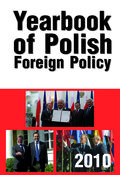The Political and Military Dimension of Polish Security Policy
The Political and Military Dimension of Polish Security Policy
Author(s): Marek MadejSubject(s): Politics / Political Sciences
Published by: PISM Polski Instytut Spraw Międzynarodowych
Keywords: Polish Security Policy
Summary/Abstract: Poland’s security environment in 2008 was the scene of significant and largely unfavourable changes. The August conflict between Georgia and Russia over South Ossetia’s status—whatever its causes and regardless of who is to blame for the outbreak—forced Euro-Atlantic states to revise their appraisals of the region’s security. The crisis also provided an efficiency test for international organisations (NATO, the EU, OSCE)—and its results, as of early 2009, were hardly unambiguous.1 The adverse impact which the crises had upon regional stability was further strengthened by the circumstance of its being both a manifestation and a consequence of Russian policy assertiveness in recent years, especially in relations with its neighbours. Russia’s growing firmness had yet another consequence of importance for Poland, namely the mounting tensions in that country’s relations with Ukraine, culminating in their successive dispute over settlements for gas shipments to Ukraine and transit fees for Russian gas sent further westwards. That crisis led to a major curtailment of gas deliveries to a number of European countries (including Poland), which only added to the uncertainty in Russia’s relations with some of its neighbours and the European Union. On the other hand, regional security was positively influenced by improved stability and predictability in the Western Balkans (notwithstanding an increase in tensions following the announcement of Kosovo’s independence in February 2008).
Journal: Yearbook of Polish Foreign Policy
- Issue Year: 2010
- Issue No: 01
- Page Range: 49-70
- Page Count: 22
- Language: English

